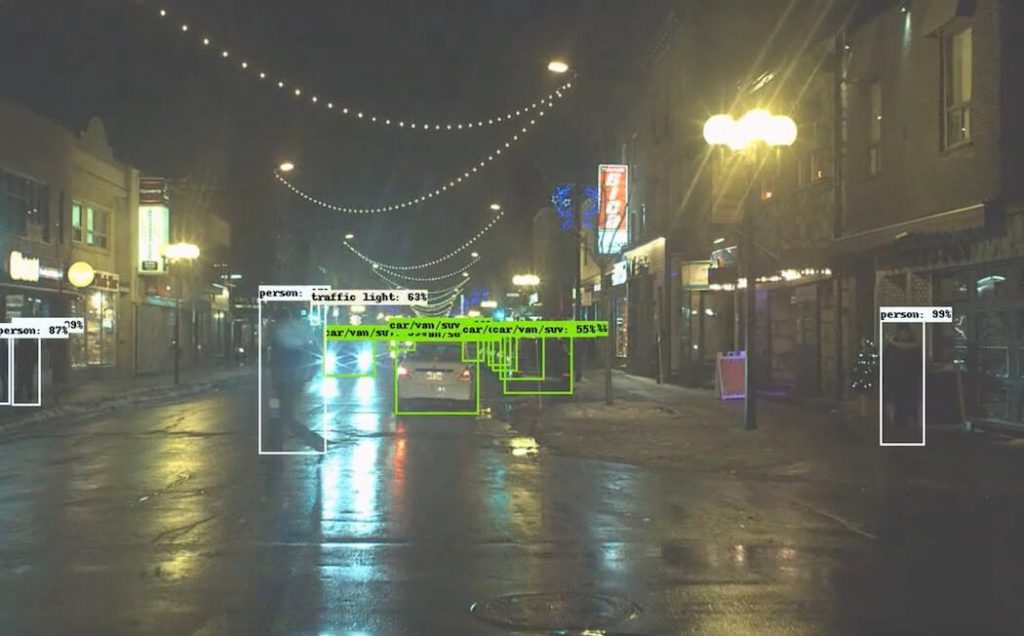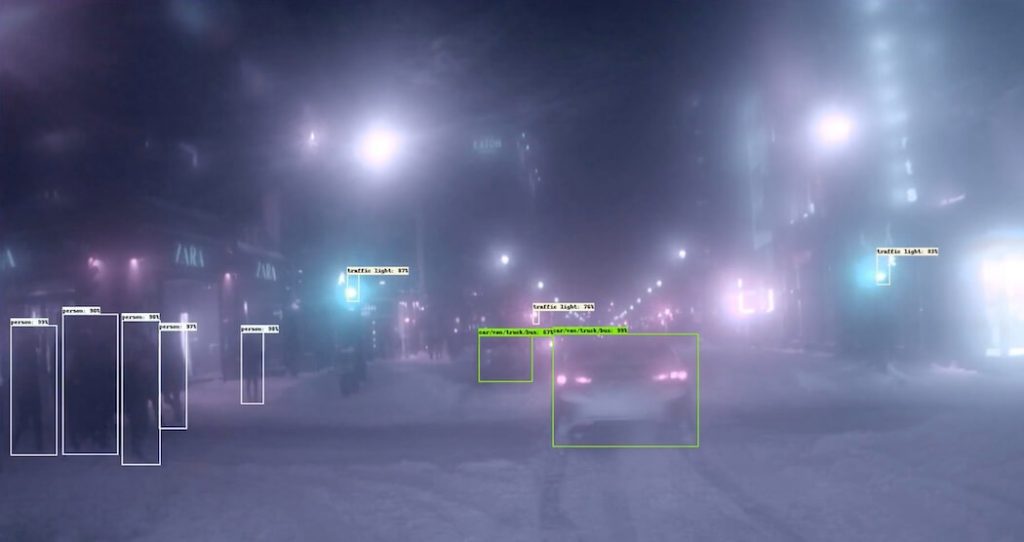Montréal-based computer vision startup Algolux has raised $23 million CAD ($18.4 million USD) in a Series B funding round co-led by Forte Ventures and Drive Capital.
Algolux is using the all-equity capital in an aim to increase the market adoption of its optimization platform for autonomous vision as the global computer vision market is set to boom over the next five years.
“The world of cameras is actually going to evolve very quickly, but we feel…in many ways, well ahead of the curve.”
Algolux is an artificial intelligence (AI) software company that has developed smart camera technology for computer vision systems. Computer vision is a field of AI that trains computers to interpret and understand the visual world. It uses cameras and videos to help systems identify, classify, and react to objects. It is used in a variety of industries ranging from energy and utilities to manufacturing and automotive.
The latest funding round brings Algolux’s total funding to date to more than $38 million CAD. The round was all primary capital and included a diverse set of investors including existing investors GM Ventures, Generation Ventures, and Intact Ventures. Investissement Quebec came on as a new investor as did Nikon-SBI Innovation Fund, and Castor Ventures, which allows MIT alumni to invest in ventures led by MIT alums (Algolux co-founder Paul Green is a graduate of MIT).
Algolux CEO and president Allan Benchetrit told BetaKit the company is in talks with other investors about the potential to raise additional funds as well.
As part of the Series B funding round, Forte Ventures partner Louis Rajczi, and Alistair Mitchell of Generation Ventures have joined Algolux’s board of directors. Alan MacIntosh of Real Ventures, which led one of Algolux’s early investment rounds, has stepped back into a board observer position.
Headquartered in Montreal and founded in 2015, Algolux’s solutions can be embedded into existing vision systems to help improve image quality in typically hard-to-see conditions, such as night, fog, and snow. Algolux claims its tech more directly integrates with camera and vision systems and outperforms existing commercial solutions when it comes to the precision of detecting objects.

Use cases for Algolux’s platform include advanced driver assistance systems and various autonomous vehicles, which have been the main focus for Algolux since it went to market in 2017. Algolux’s customers include original equipment manufacturers (OEMs) and companies that supply parts to automotive manufacturers.
Algolux claims a key differentiator between the startup and competitors in the computer vision space is the fact that its platform is essentially brand agnostic and can be embedded and used with various camera products.
Benchetrit also pointed to the robustness (the ability of a computer system to cope with errors) of the company’s machine learning system as a key differentiator.
“We’ve been very focused on this case of robustness,” he said in an interview. “It isn’t just about being able to do object detection, you could do that with a publicly available neural network, you don’t have to actually build any proprietary IP to do that. I think it’s the focus around robustness and this idea that if you are going to move towards greater and greater levels of autonomy, you are going to have to raise the bar on the requirements [for camera detection].”
“The world of cameras is actually going to evolve very quickly, but we feel like we’re, in many ways, well ahead of the curve,” Benchetrit added.
RELATED: Raquel Urtasun launches new self-driving startup Waabi with $100 million CAD from top investors
Reports put the global computer vision market at $15.9 billion USD in value currently, with the expectation it will grow significantly over the next five years. The market could reach a global value of $51.3 billion USD by 2026. In the automotive industry specifically, the use of automotive cameras continues to grow as the use of semi-autonomous and the development of autonomous vehicles becomes more mainstream. Algolux pointed to expectations that global automotive camera shipments are expected to surpass 300 million units by 2025, reaching $25 billion in revenue.
When looking at autonomous vehicles as a use case, one of the consistent problems researchers and developers face is issues with performance and vision in low light or poor weather conditions. Algolux touts its solution as a problem solver for these types of conditions.
“Today, computer vision cameras, especially in the automotive world, are becoming more and more vastly deployed,” Benchetrit said. “However, they have an Achilles heel.”
“They tend to be pretty good performers in what’s referred to as Goldilocks condition, so blue sky [and] dry roads,” the CEO said. “But, as soon as you start to move into lower light situations … the accuracy drops off dramatically to the point where the camera, basically, becomes a negligible piece of technology. So, that is really the core focus of Algolux, to resolve that problem.”
Guy Leblanc, president and CEO of Investissement Quebec, called Algolux a leading AI provider in the vehicle computer vision market.
“We fully expect that computer vision systems will be an increasingly important part of the future safety and functionality of vehicles, and a necessary complement to other sensors like LiDAR and Radar,” added Forte Ventures’s Rajczi. “We understand that these camera systems must function in extremely challenging environments (low light, poor weather, glare) and believe Algolux has developed a world-class solution that provides exceptional performance in these types of conditions.”

Algolux has been recognized in the AI industry as a notable player. This year, the startup was one of five Canadian companies to make CB Insights’ fifth annual AI 100 list, which aims to highlight the most promising and innovative private AI companies in the world. Algolux also works with leading tech companies and universities like Stanford, Princeton, Columbia, and the University of Toronto regarding computer vision technology.
The company was co-founded by Felix Heide who serves as its chief technology officer and is also a professor at Princeton, where he leads the Princeton Computational Imaging Lab.
With its Series B capital, Algolux is looking to increase market adoption of its tech on a global level. Part of that includes growing the company’s engineering and customer enabling teams to help customers integrate Algolux’s platform into their systems.
RELATED: BlackBerry launches $50 million fund to work with AutoTech startups
To achieve its goal of being a globally recognized player in the space, Algolux recently brought on Matthias Schulze as its vice president for Europe and Asia. Schulze brings with him more than 20 years of experience in the advanced driver-assistance systems industry, having worked at notable German-based car companies like Daimler AG.
In addition to the current vertical, Algolux is also eyeing others where its camera applications might be useful. Benchetrit said the startup is currently working with household name companies to deploy its vision technology and it talks with others. Other areas where Algolux’s technology can make sense include various forms of robotics, manufacturing, fleet management, and more.
“The opportunity to optimize cameras automatically through machine learning is one that spans across a number of different verticals and literally hundreds of products,” Benchetrit said. “Today, most of the work that’s being done in that space … is being done manually, if at all. So, the opportunity to be able to address that, either with our embedded neural network or through more than a cloud-based ecosystem play, is something that we think has tremendous scaling opportunities for [Algolux].”
Images courtesy Algolux


